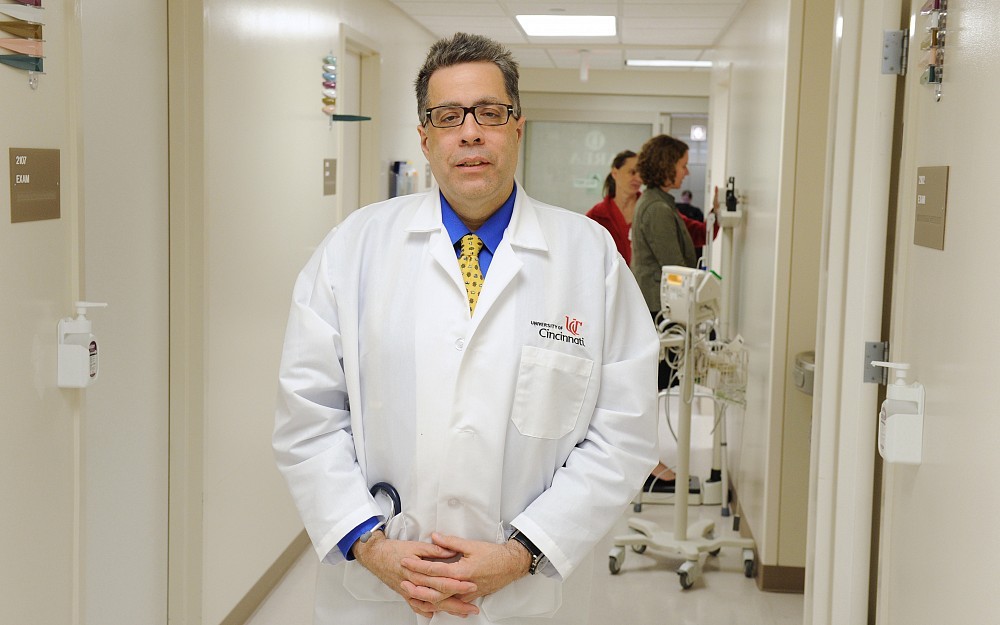
First Patient Treated With Next-Generation Immunotherapy at UC
CINCINNATIThe first patient in an upcoming national Phase I clinical trial, looking at a next-generation individualized cancer therapy which harnesses the patients own immune system to attack cancer, was treated Tuesday, May 1, at the University of Cincinnati (UC) Medical Center.
The trial, led locally by John Morris, MD, professor of medicine and director of the UC Cancer Institutes Phase I/Experimental Therapeutics Programthe only Phase I program in the regionwas administered to Josh Minton, a 30-year-old Aberdeen, Ohio, resident to determine the safety and efficacy of the treatment.
Ross Ristagno, MD, associate professor in the Department of Radiology and section chief of Interventional Radiology for UC Health, administered the treatment to Minton. Morris, also a UC Health oncologist, is a Phase I specialist trained in viral and gene therapy.
"Im excited to be part of this truly innovative trial, says Minton, who is being treated for a neuroendocrine tumor which originated in his pancreas. Minton retired from the military in February 2018 because of his illness but remains active as an avid bicyclist and outdoors enthusiast.
"I want to help inspire people and let them know that cancer doesnt mean its the end, he adds. "I treat my cancer like any chronic disease.
EpicentRx, a San Diego biotechnology company, developed this vaccine which involves use of a virus to potentially infect and kill cancer cells in various cancer types. These viruses are tailored to the tumors of individual patients.
"We are able to biopsy a tumor and sequence its genome to find what is making that specific tumor cancerous. Samples of the patients tumors and normal DNA from blood undergo whole-exome sequencing to reveal mutations present only in the tumor, says Corey Carter, MD, CEO of EpicentRx and former oncologist with Walter Reed National Military Medical Center who worked with Morris during Morris training at the National Cancer Institute in Maryland. "We then are able to create virusesbiological agents that reproduce inside the cells of living hostsbased on knowledge gained from this sequence to replicate peptide fragments, or chemical reactions, and neoantigens, which are cancer-specific antigens, to stimulate the patients immune cells to infiltrate and attack the cancer cells.
"Viruses naturally target and kill cancer cells and these personalized viruses, which are derived from viruses that cause the common cold, have been engineered to improve on that ability since they use the machinery of the cancer cell to produce thousands of copies of themselves and the neoantigens that they are carrying. Hence, these viruses are administered with the goal of training the immune system to seek out and destroy the cancer cells that display these neoantigens.
The trial, while approved by FDA, is not yet open to the general public. The federal Food and Drug Administration granted a special compassionate use exemption to treat Minton; there is no cost to the patient. A broader trial is in the planning stages.
Morris says this trial is promising in the field of immunotherapy.
"The reality is that other immunotherapies only benefit 20 to 25 percent of patients in selected tumor types, Morris says. "No two cancer cells are exactly alike, making it difficult to target cancer cells with drugs that inhibit one receptor or even one pathway since the cancer cells may and often do vary with respect to genetic changes and survival mechanisms.
"This personalized viral vaccine has the ability to express many different neoantigens from the tumor, targeting multiple genetic mutations in tumor cells, which could potentially prevent the cancer cells from sidestepping the immune system. We are excited to be part of this trial, which could prove beneficial for many patients.
The virus used was manufactured at the EpicentRx facility in La Jolla, California, according to Good Manufacturing Practice (GMP) regulations.
Tags
Related Stories
UC lab using $2.6M grant to study type of heart disease linked...
July 17, 2025
A University of Cincinnati College of Medicine researcher has been awarded a $2.6 million federal grant to study a potentially deadly form of heart disease that affects people with diabetes called diabetic cardiomyopathy.
Two local families host special blood drives
July 17, 2025
Two Tristate families are turning personal journeys into community impact by hosting specialty blood drives in honor of their children this July.
Champions of progress and opportunity
July 16, 2025
Tom met his wife, Pam Mischell, DAAP ‘71, as a University of Cincinnati student. When a date canceled his plans to go to a concert, he asked a Phi Kappa Theta fraternity brother to help him find a new date.
